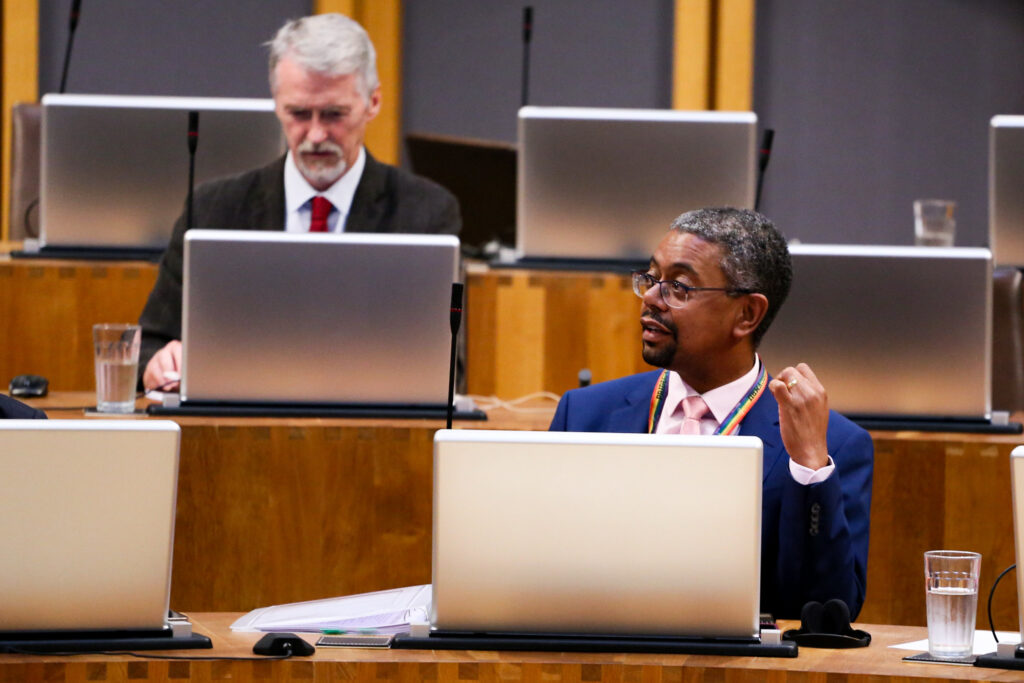Lee Waters, Cathy Owens and Ed Poole discuss the Smith Commission in the latest IWA Podcast.
Thursday the 27th November saw the publication of the report of the Smith Commission, the commission established by David Cameron in the wake of the referendum.
The report sets out cross party recommendations for the next steps for devolution in Scotland, endorsing:
- The Scottish Parliament to have the powers to set income tax rates and bands along with receipts from the first 10% of VAT to be assigned to Holyrood.
- Some welfare devolution to include; powers to vary the under occupancy charge (bedroom tax), benefits for carers, disability allowances and fuel allowances.
- Air passenger duty to be devolved
- Powers over Scottish Parliament and local elections to be devolved
These recommendations mark a big step for the future of Scotland and have great implications for the UK as a whole, but Scottish Ministers have claimed the report doesn’t go far enough. A Scotland Bill will now be published on Burns night, in Mid January, to formally take forward these recommendations, but this legislation won’t be completed before the General Election in May.
In this edition of the IWA podcast, Lee Waters, IWA Director, Cathy Owens, Director of Deryn and Ed Poole, a Lecturer in Politics at the Wales Governance Centre, Cardiff University discuss some of the bigger issues arising out of this report.
Does this report ensure a stable settlement for devolution in Scotland and what are the implications for Wales, England and the UK as a whole? Listen below and join the debate on Twitter with the hashtag #IWAPodcast.






No, despite the hype in the press this is no “big step”, it is in fact more of a figleaf, the absolute minimum they could get away with and yet be seen to do something. There is little effective control over finance, and any extra cash raised locally will be deducted from the block grant. So of the powers were present in the previous Scotland Act, already passed, in any case. There is no overall control over welfare and benefits, simply a little tinkering allowed within the system at Scotland’s expense, which more or less is what the Scottish Government have already been doing as far as they can to alleviate the worst effects of Westminster austerity.
Brown personally guaranteed ‘Home Rule’ and Darling backed him up the next day. Both have now resigned from politics and so are in no position to guarantee anything. Home Rule or Federalism has always been understood to mean full control of everything goes to Scotland by default, apart from defense, foreign affairs and some aspects of high finance, which remain UK wide. Scotland would raise all its own funds and pay an agreed fee to London for the central services.
So no, the ‘Vow’ has not been delivered, not by many a mile. The result will be anger and confrontation where conciliation might have been possible if the matter had been approached sensibly and with good will. Good will however requires respect between all parties, something the colonial mentality of London prevents. One result will be the almost certain elimination of ‘Scottish’ Labour as a political force. Of course maybe this is what Cameron had in mind all along. Was it for him simply a clever ploy to stuff Labour?
Meanwhile SNP membership has passed 92,000 and is still rising …
Interesting discussion.
The Smith Commission devolves nothing to Scotland. He makes recommendations which have to be enacted at Westminster by a Government & Parliament of unknown composition. Some of the recommendations have been made previously, and ignored.
Income tax has not been devolved in its entirety as the personal allowance will be determined by the Treasury. Moreover it’s virtually impossible to vary income tax within a unitary state. The existing 3p in the £ has never been used since the Parliament’s inception. Westminster reserves the power to levy a UK-wide income tax surcharge. It appears that deductions will be made from Scotland’s block grant to compensate for any gain from income tax changes, making the powers effectively redundant. Give with one hand, take away with the other. Some 70% of tax powers remain at Westminster.
The welfare powers are marginal, universal credit being reserved together with pensions.
The Vow made by the three party leaders via their proxy Gordon Brown was ‘as close to home rule as is possible in a federal state’. Historically home rule has been understood as all domestic powers, with defence & foreign policy reserved. Smith comes nowhere near this. It’s clear, and has been for years, that two-thirds of Scots want home rule by that definition, and the referendum proved that nearly half would prefer independence.
Effectively, in my opinion, Smith is a dead duck. If the SNP gain 30+ seats in May, then Smith will be history, and far more extensive powers will result. If Labour win a majority of seats in Scotland, and at Westminster, it’s doubtful that Smith’s recommendations will be enacted. If the Tories win and the SNP don’t hold the balance, then only powers to increase Holyrood’s financial accountability will see the light of day.
I doubt the Scots will be pleased with the proposals as they stand. The British establishment will ensure that propaganda will be in full flow during the next six months as witnessed by the BBC’s coverage of Gordon Brown’s ‘reset’ speech today.